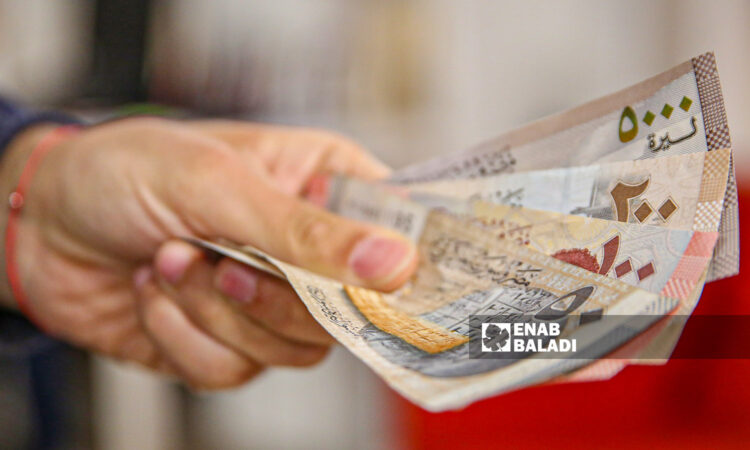
Enab Baladi – Maria al-Shaaban
For years, the Syrian regime has been trying to control the dealings with foreign and local currencies within the country, legislating this through several decrees and decisions it issued regarding the ban on dealing with foreign currencies for any type of commercial exchange, and imposing penalties on those practicing the profession of currency exchange and money transfers abroad without a license, the latest of which are decrees number “5” and “6,” issued at the beginning of the current year.
Syrians, both individuals and official and unofficial remittance offices, try to circumvent the imposed conditions to avoid charges of “terrorism,” endeavoring to continue the flow of remittances, which constitute a source of livelihood for both parties, the sender and the recipient, as well as the intermediaries.
Lebanon is considered the intermediary country and an outlet for some of the financial remittances from and to Syria, as it constitutes one of the methods adopted by transfer offices in case of capital shortages in the country or to enhance their currency balances.
Why Lebanon?
Syrian remittance offices spread around the world depend on their agents or intermediaries in Lebanon as one of the outlets for disbursement and storing money, with Lebanon being chosen over other neighboring countries due to the open crossings between the two countries and the private transport lines traveling through them almost daily, in addition to other reasons mentioned by “Mohammad,” a pseudonym for a Syrian engineer working at a construction company in Turkey who also owns a remittance office to and from Syria, requesting not to disclose his real name for security reasons.
More securely monitored
The security factor is at the forefront of the reasons for owners of remittance and exchange offices, which carry the nature of a black market, to transfer money to their agents in Lebanon as a preliminary stage, in order to avoid legal accountability and possible threats that the sender or recipient in Syria might face if found to possess foreign currency or large sums delivered through unofficial outlets.
Lebanon does not prohibit the handling and receipt of remittances in foreign currencies, unlike the sanctions imposed on the Syrian citizen if proven dealing with foreign currencies, according to decree number “5” issued by the President of the Syrian regime, Bashar al-Assad, reaffirming a previous decree banning the dealing with anything other than the Syrian pound as a means of payment, or for any type of commercial trading, whilst maintaining imprisonment or jail sanctions, and allowing defendants the right to “settle” before the court, to drop the prison sentence that may reach up to more than seven years in some cases.
Dealing with financial remittances in Lebanon is either done by physically transferring them to Syria through intermediaries and individuals associated with the Syrian security apparatus, who turn a blind eye to transferring remittances to Syria, or by preserving liquidity in the intermediary country Lebanon until requested or for commercial exchange between offices.
Liquidity shortage
The lack of liquidity in some offices in less populous villages or towns in Syria and sometimes in the capital Damascus, come as a second reason why some remittance offices rely on Lebanon as a station for their transfers.
The lack of liquidity necessitates postponing the delivery of the remittance until the required amount is secured within the office. Transferring money to Syria via taxi drivers operating on the Syria-Lebanon line is one of the ways to secure the required amounts, according to “Mohammad,” the owner of the remittance office.
If the transferred amounts are large, coordination is done with Syrian and Lebanese officers on the border between the two countries, and with military checkpoints if they exist, to provide protection and facilitate the path of the bearers, with a variable percentage paid to the officers and facilitators in exchange for allowing them to cross.
Varying fees
The fees for money transfers sent from various countries around the world to Syria, whether through Lebanon or directly to Syrian cities, vary based on several factors including the amount and the requested city, and differ from one remittance office to another, according to “Mohammad,” who works in transferring money from Turkey to Syria.
The term “remittance office” is mostly used metaphorically because most of those working in this field do not rely on actual offices but on capital in specific points, cities, banks and a vast network of acquaintances.
The transfer fees are borne by the sender and range between 0.3% and 10%, according to the amount, the number of intermediaries between the sender and receiver, and the currency required upon receipt.
The fees for remittances are often inversely proportional to their value, with the fee percentage increasing as the amount decreases and decreasing with its increase.
The continuous and almost instantaneous change in the exchange rate of the Syrian pound against the US dollar is an important factor in the remittance fees and exchange rates, their value or fees being determined according to the exchange rate of the pound at the moment of the customer’s request, meaning the exchange rate of remittances changes several times within a single day.
Many Syrians prefer to transfer via the black market, considering that the exchange rates set by the regime are far from the real value of the currencies.
Over the past years, the Syrian regime set multiple exchange rates for foreign currencies against the Syrian pound in an attempt to control the value of the pound and benefit from exchange rate differences.
Crackdown on use of foreign currencies
The sanctions imposed by the European Union on individuals and institutions in Syria have affected the Central Bank of Syria (CBS), while both Canada and Turkey banned dealings with it.
The Arab League suspended all transactions with the CBS and the state-owned Commercial Bank of Syria, as well as stopped financial transactions and trade agreements with Syria. The United States added the Commercial Bank of Syria to a blacklist containing companies with frozen assets.
The sanctions impacted Syria, both government and people, placing the country under an almost economic blockade, which increased the movement of financial remittances from Syrian expatriates to their relatives inside the country in an attempt to support them financially. Naturally, the remittances are sent in dollars or euros.
Liquidity shortages and economic deterioration pushed the Syrian regime to issue decrees to control dealings with foreign currencies, aiming to affirm the ban on dealing with foreign currency in financial transactions that do not bring real economic benefits, such as daily exchange transactions, and the activity of money transfer offices, according to what the research assistant at the Jusoor for Studies Center, Abdul Azim al-Mugharbel, told Enab Baladi in a previous economic report. In recent years, legislative decrees number “3”, “4”, “5”, and “6” were issued, which revolve around banning dealing with anything other than the Syrian pound, imposing financial penalties and the threat of imprisonment.
Al-Mugharbel mentioned that the activity of the regime’s government focuses on achieving the greatest gains by benefiting from the proceeds of fines and monetary tightening to ensure the non-leakage of foreign currencies outside the Central Bank of Syria.
The Syrian regime seeks to limit the options for the expatriates to transfer their money through legitimate means via exchange companies linked to the Central Bank, despite offering the exchange rate of the Syrian pound against the dollar at a lower rate than the black market.
Some people resort to sending remittances to licensed exchange offices in Syria, including al-Haram and al-Fouad, and Western Union, to avoid legal accountability and the imposed sanctions in case their dealings with unofficial offices are discovered, which are often dealt with secretly and in brief meetings to receive the remittance.
At the time of writing this report, the exchange rate of the Syrian pound was 14,650 against the US dollar, according to the S-P Today website, which is specialized in monitoring the movement of foreign currencies, while the exchange rate was 12,625 Syrian pounds according to the official market bulletin of the Central Bank of Syria.
Families and individuals in Syria rely on remittances sent to them by relatives and providers from various countries in the world, due to the scarcity of salaries against the rising prices, and the difference between the official exchange rate and the black market rate leads them to choose the black market remittances.
In the latest increase in salaries, a decree by the President of the Syrian regime, Bashar al-Assad, issued on February 5, approved a 50% increase in the wages of civilian and military employees and retirement pensions.
Thus, the minimum wage increased from 185,940 to reach 278,190 thousand Syrian pounds (about 19 US dollars).




